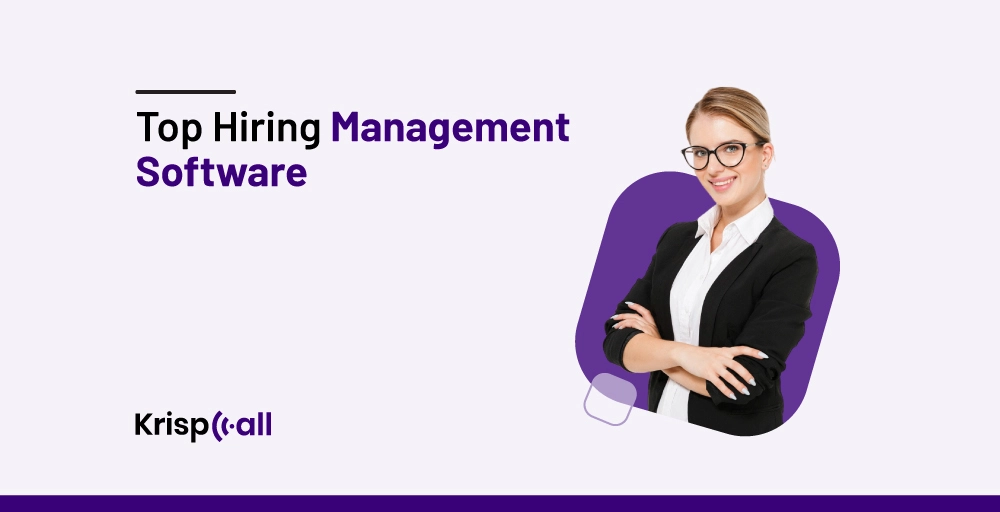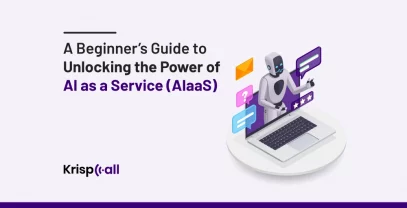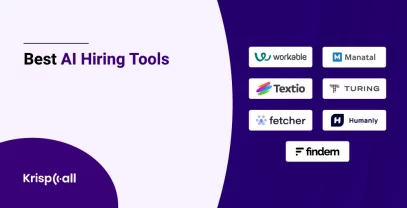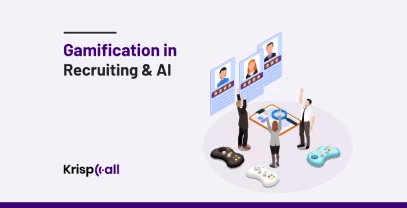The old way of finding jobs through printed classified ads 📰 is a thing of the past. Nowadays, most professional postings are listed online. As remote work becomes more common, companies aim to conduct hiring virtually from start to finish.
Businesses receive a high volume of applications, and it can be difficult to manage them all properly. So, what’s the best way for companies to collect, organize, and fairly evaluate every candidate? 🤔 The solution is using a hiring management system (HMS).
Through a hiring management system, a company can streamline and optimize the entire recruitment process by tracking jobs, screening candidates, and evaluating candidates. It also automates tedious tasks like scheduling interviews.
In this blog, you’ll learn what a Hiring Management System (HMS) is, review the best hiring management software options, offer tips on how to choose the right HMS software and explore future trends in HMS.
🔑 KEY HIGHLIGHTS
- A Hiring Management System (HMS) is software used for recruitment processes designed to streamline and automate the process of recruiting and hiring employees.
- The top 6 hiring management software are Manatal, Workable, Ceipal, JazzHR, Zoho Recruit, and Recruit CRM.
- Candidate tracking, automated workflows, analytics capabilities, and scalability are features to consider while selecting hiring management software.
- Choosing the best hiring management software should be assessed based on its ability to help meet goals, such as a shorter time to fill out and a boost in candidate quality.
- Future HMS trends include advanced AI/machine learning, predictive analytics, and enhanced mobile apps.
6 Best hiring management software in 2024
Hiring management software allows businesses to streamline and optimize recruitment strategies and processes. Therefore, choosing the best recruitment software should be carefully considered.
We selected this software based on customer reviews, affordable pricing, wide use cases, and availability of various useful features.
| Hiring software | Pricing | Use cases | Best For |
| Manatal | Starts at $19/user/ month | Organize and find qualified candidates, write job descriptions | Most Teams |
| Workable | Starts at $189/user/ month | Manage candidates, track hiring process, promote DEI hiring | Growing businesses and HR teams |
| Ceipal | Starts at $24/user/ month | Application tracking, resume parsing, reporting, internal/external hiring | Best for IT, General, and Healthcare staffing |
| JazzHR | Starts at $99/user/ month | Easy applicant tracking, collaborative hiring, job board posting | HR teams, recruitment agencies, and headhunters |
| Zoho Recruit | Starts at $30/user/ month | Basic ATS features, applicant sourcing, reporting | Staffing agency or internal HR team |
| Recruit CRM | Starts at $50/user/ month | Applicant tracking with CRM, staffing workflows, LinkedIn sourcing, Recruitment Database Software | Staffing agencies |
1. Manatal
Manatal is recruiting software that lets you store information about people who might be good for open positions. It makes it easier to gather and sort contacts and applicants, helping you fill jobs faster. The candidate profiles in Manatal allow for detailed tracking of skills, experience, correspondence, and other important applicant details.

Organizations can hire better and more efficiently by combining all recruitment efforts into one intuitive system. Features like artificial intelligence tools, social media profile enrichment, remote team management, robust reporting, full API access, multi-channel job posting, and more allow users to transform how they attract and evaluate talent.
⭐Features
- Candidate Sourcing
- AI Recommendations
- Candidate Enrichment
- Data Privacy Compliance
✔Advantages
- The prices are transparent upfront.
- You can try it for free before paying.
- It has an AI tool to help write good job postings.
- Has the flexibility to meet the needs of in-house or outsourced hiring.
❌Disadvantages
- No mobile app.
- It doesn’t have an internal job board.
- It doesn’t focus much on the candidate’s experience.
- You can’t message applicants by text or chat.
💰Pricing
- Professional plan – $19 per user per month
- Enterprise plan – $39 per user per month
- Enterprise Plus plan – $59 per user per month
- Custom plan – On Demand
2. Workable
Workable is one of the best global hiring platform and a cloud-based applicant tracking system, also known as an ATS, that helps company hiring managers find people to interview and keep track of where candidates are in the process. Workable provides a scalable solution with an artificial intelligence tool to assist with tasks like suggesting the best candidates. The system scales as job requirements change with company growth.

Moreover, being workable gives companies everything they need to manage their employees. It can be customized to securely handle personal data, track and manage time off, create reports, and connect to payroll systems. Features like org charts, directories, and a mobile app make effective talent management easy for HR teams and staff.
⭐Features
- AI-powered Candidate Recommendations
- Automated Targeted Outreach
- Language Options
- Referrals Portal with Reporting
✔Advantages
- Easy to use.
- It focuses on hiring that promotes diversity, equity, and inclusion (DEI).
- The system can expand with your company as you grow bigger.
- 70+ third-party integrations.
❌Disadvantages
- It doesn’t offer many features for bringing new hires on board.
- The search tool has limitations.
- Expensive.
- Video interviews are only included in the Premier plan.
💰Pricing
- Starter plan – $189 per month
- Standard plan – $378 per month ($3,756 billed annually)
- Premier plan – $628 per month ($7,536 billed annually)
3. Ceipal
Ceipal’s is another software used for the recruitment process in various situations. It offers applicant tracking software (ATS) and a way to manage relationships with customers and candidates (CRM). It is designed for companies doing their own hiring or hiring through other companies, as well as staffing agencies and recruiting firms.

Ceipal has a history of crafting customizable solutions and innovating HR and talent acquisition technologies using accessible, cutting-edge tools. They provide a 360-degree platform for all talent functions designed to be easy for all roles to use.
⭐Features
- Automated Resume Parsing
- Hiring Process Tracking
- Workflow Building
- Candidate-Facing Status
✔Advantages
- Easy to find and match candidates.
- Profiles give a full picture of each applicant.
- Presence of document Library.
- Availability of helpful features from ChatGPT.
❌Disadvantages
- Have to pay to try it after an initial demo.
- A few listed features are not available yet.
- No option to ask questions live through chat.
- Has only one pricing plan.
💰Pricing
Ceipal has one pricing plan that costs $24 per month. A free trial is also offered to test Ceipal ATS before paying any money.
4. JazzHR
JazzHR is a user-friendly applicant tracking system. It allows unlimited people to use the software and share job postings on over 18 highly trafficked job boards through integrations. JazzHR aims to simplify hiring from start to finish by publicizing openings and enabling new employees to complete all required documents easily.

You can effectively compete for top talent in real-time and make excellent hires so you can focus on growing your business and employees. JazzHR has received numerous accolades from customers and is consistently ranked highly as an applicant tracking system.
⭐Features
- Collaborative Hiring
- Compliance & Reporting
- Candidate Sourcing
- Interviews & Assessments
✔Advantages
- An unlimited number of people can use the system.
- It’s simple to figure out and get the hang of.
- Built-in messaging features are straightforward.
- Affordable entry-level plan.
❌Disadvantages
- It offers fewer features than some other similar programs.
- Unlimited postings and top-tier features are available only in the higher plan.
- Serves as an applicant tracking system only, not a full-blown human resources records system.
- Lacks advanced features large organizations require.
💰Pricing
- Hero plan – $99 per month
- Plus plan – $325 per month
- Pro plan – $499 per month
5. Zoho Recruit
Zoho Recruit is a free recruitment software that provides a full applicant tracking system for company HR teams and staffing agencies. The software has many customizable options and enables seamless integration with other Zoho tools and other apps, helping users manage and monitor every step of the hiring process.

Zoho Recruit helps you source, track, and hire top candidates without juggling multiple tools. Also, you can customize every aspect of your workflow and automate tasks like emailing, updating interview statuses, etc. Likewise, you can access reports and analytics at your fingertips to improve hiring strategies.
⭐Features
- Social Recruiting
- Hiring Analytics
- Background Screening
- Hiring Pipeline
✔Advantages
- Provides onboarding tool to transition new hires smoothly.
- You can get a refund within 45 days if you are not satisfied.
- Highly customizable to fit expanding business needs.
- Integrates seamlessly with other Zoho tools and other apps.
❌Disadvantages
- No 24/7 customer support.
- New users may find the extensive options intimidating since there is a lot to learn.
- Not suitable for large-scale organizations.
- Limited customization.
💰Pricing
- Forever free: $0
- Standard plan – $30 per user per month
- Professional plan – $60 per user per month
- Enterprise plan – $90 per user per month
6. Recruit CRM
Recruit CRM is another hiring management software that combines applicant tracking and customer relationship management. It is a good fit for recruiting companies, headhunting businesses, and staffing agencies, regardless of size. It tracks applicants and allows managing relationships with clients in one integrated system.

Recruit CRM offers advanced features like an AI-powered resume analyzer that can extract resume data directly from emails. It also provides a clear Kanban view for sales and recruiting, along with email automation and powerful search capabilities, making it an excellent choice for staffing agencies.
⭐Features
- AI Resume Parsing
- Candidate Matching
- Automated Outreach with Email Sequencing
- AI GPT Integration
✔Advantages
- Has a Chrome extension for LinkedIn sourcing.
- It can automatically read resumes and suggest matches.
- Advanced AI features are included with every subscription level.
- You can try it out for as long as you want before paying.
❌Disadvantages
- Restricted to only two recommended candidates in one plan.
- Interview scheduling and rating tools are somewhat limited.
- Issues with integration
- Some useful features are missing.
💰Pricing
- Pro plan – $50 per user per month
- Business plan – $79 per user per month
- Enterprise plan – $90 per user per month
What is a hiring management system?
A hiring management system (HMS) is software used by human resources to facilitate the entire recruiting process. The HMS helps streamline hiring decisions by centralizing candidate profiles and automating workflows.
A standard HMS operates similarly to an enhanced applicant tracking system (ATS), offering all the automated administrative features of an ATS and customer/candidate relationship management (CRM) abilities. The HMS provides reporting and analytics capabilities to gain insights.
While an ATS is generally adequate for smaller businesses, an HMS provides full-service functionality, making it better suited for medium to large-scale organizations.
The HMS automates several recruiting functions, including:
- Advertising open job roles
- Scheduling interviews
- Answering frequent candidate questions via a chatbot
- Providing templates for job postings and candidate correspondence
- Sending reminders to recruiters
- Matching applicants to available positions
- Maintaining ongoing contact with applicants through each stage
How to choose the best hiring management software?
An HMS can help by saving time that would otherwise be spent manually sorting through applications. However, for candidate management software to be truly effective, it must help to optimize and enhance the hiring process while facilitating sustainable growth over the long run through its unified platform.
Let’s examine some key factors to consider when choosing the most suitable recruiting software option:
- Understand your challenges: Closely examine your existing recruitment process to determine what is causing problems, whether sorting through a huge number of resumes or finding it difficult to maintain candidate interest. Recognizing your particular issues is the first step to identifying the appropriate solution.
- Explore the features: Now that you understand your needs, it’s important to investigate the options available. Research various software platforms and determine what functions they provide. Ensure these align with your recruiting requirements, such as candidate tracking tools, automated workflows, or analytical features.
- Consider the ROI: Recruiting is not simply about filling vacancies. It’s about achieving organizational objectives. Look for software that helps achieve objectives like reducing the time it takes to fill positions or improving the quality of candidates. Connecting the software’s features to these positive outcomes can provide long-term advantages.
- Consider your budget: Consider your budget and whether the software can scale with organizational expansion. Seek an option that delivers a balanced mix of features and price points, not exceeding financial limits yet fulfilling present requirements. The ideal solution provides appropriate functionality for a suitable cost, allowing growth without overstretching budgets.
- Evaluate scalability: It’s important to find software that can scale based on how much hiring you need to do. Look for programs that combine different recruiting features to solve specific problems. They should also connect smoothly with other apps you already use. Pick one that has room to expand if your recruiting responsibilities increase in the future.
- Read user feedback: Dedicate time to reading reviews and testimonials from other recruiting and HR professionals with direct experience using the software. They provide a meaningful perspective on what succeeds, where it may fall short, and how responsive assistance is. Their first-hand insight serves as a trusted recommendation before a major selection.
- Ensure dedicated customer support: Given that most vendors customize offerings to tailor solutions, high-quality customer assistance becomes important for addressing queries, debugging problems, and minimizing disruptions. When choosing a program, pick one where support will be available to assist people 24/7 via phone calls or chats.
Future Trends in Hiring Management Software
Hiring Management Software will continue to advance in the future. Hiring software will start using dedicated AI recruitment tools to automate tasks like resume screening. Here are some future trends to look out for in Hiring Management Software:
AI and machine learning applications
In the future, hiring management software will increasingly use artificial intelligence (AI) and machine learning. AI can take on routine tasks that typically require human intelligence, such as screening resumes, answering common candidate questions, and scheduling interviews. It will also help quickly sort through large amounts of candidate data, organize it, and compare it against job requirements to find the best matches.
Moreover, AI will also help reduce bias in hiring decisions. Unlike humans, AI systems don’t unintentionally favor candidates based on factors like gender, ethnicity inferred from names, or other characteristics that could lead to discrimination. Instead, AI evaluates candidates based on their skills, qualifications, and relevant experience, ensuring a fairer and more objective selection process. AI has the potential to greatly improve the efficiency of recruiting processes in the years ahead.
Enhanced mobile capabilities
As more people use phones and tablets for everything, hiring software is expanding its mobile capabilities. Future trends will include recruiting programs designed first for mobile with fully featured apps. Hiring managers may be able to initiate new job requisitions, track referral programs, and input details from their mobile devices using hiring apps.
Everything from sourcing to onboarding processes may be handled by smartphone or tablet. These mobile enhancements aim to make the recruiting process more convenient and connected for all users in today’s increasingly mobile-centric world.
Predictive analytics for talent acquisition
Another trend is that hiring software will get even better at predictive analytics. Predictive analytics is when programs look at past hiring data and use it to predict future outcomes. Hiring management software analyzes things like who was hired before, how long they stayed at the job, and their performance reviews.
They’ll use that information to develop models that can analyze candidates and predict who will like the job, stay with the company long-term, and get high marks in reviews. This helps recruiters focus on applicants most likely to be top performers. By analyzing patterns in past resume data through techniques like resume parsing, they can predict top candidates.
Conclusion
HR technology solutions continue to evolve, with innovative software enabling companies to manage recruitment processes more efficiently. These solutions integrate AI, predictive analytics, and enhanced mobile capabilities, reflecting a shift towards more streamlined and data-driven hiring practices.
This software can help optimize many aspects of the hiring process, including job advertising, candidate evaluation, and interview scheduling. Features like automation and analytics also aim to enhance areas like background checks over time.
Besides this, they keep the hiring process well-organized by following each applicant through the recruitment process and enabling clear communication at every step. They also save significant time, allowing hiring teams to concentrate on crucial tasks and keeping candidates involved in the selection process. They aim to streamline the process of defining and tracking candidates who fit the job requirements.
FAQ
Why might a human resources manager want to use recruiting and hiring management software?
A human resources manager might want to use recruiting and hiring management software to organize the recruitment process, automate repetitive tasks, improve candidate tracking and evaluation, and make data-driven decisions to enhance the overall quality and efficiency of their hiring efforts.
What is the best software for recruitment?
The best software for recruitment are: Manatal, Workable, Ceipal, JazzHR, Zoho Recruit, and Recruit CRM.
What is the best platform for hiring?
Some of the best platforms for hiring are Manatal, Workable, Ceipal, JazzHR, Zoho Recruit, and Recruit CRM.
What is CRM recruitment software?
CRM recruitment software is a software solution that oversees the entire recruitment process while developing and preserving relationships with applicants. Recruitment CRM gives you the tools to efficiently nurture connections with prospects, track interactions, and fill roles by matching the right people to opportunities.
How much does recruiting software cost?
Recruiting software costs range from anywhere between $0 to $719 per month.
What are the types of recruiting software?
The types of recruiting software are:
- Sourcing Software
- Applicant Tracking Systems (ATS)
- Engagement Software
- Selection Software
- Hiring Software





